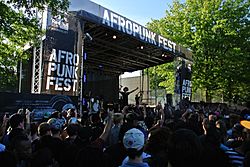Afropunk Festival facts for kids
Quick facts for kids Afropunk Festival |
|
|---|---|

2013 Afropunk Festival
|
|
| Years active | 2005-Present |
The Afropunk Festival is an exciting yearly event that celebrates music, movies, fashion, and art. It features creative works by black artists who often have a unique or "alternative" style.
This festival started in 2005 at the Brooklyn Academy of Music in New York City. Over the years, Afropunk Festivals have also taken place in many big cities around the world. These include Atlanta, Paris, London, Brazil, and Johannesburg, South Africa. The festival was started by James Spooner and Matthew Morgan. It grew from a 2003 movie called Afro-Punk, which looked at the lives of black punk rock fans across America.
Contents
Discovering Afropunk's Journey
Early Years: 2005-2008
In its first few years, the Afropunk Festival was mainly for black punks and people with similar alternative interests. It was a free event, supported by The Brooklyn Academy of Music. As the festival became more popular, the types of music played started to change. This was done to attract a wider audience. The festival also began charging an entry fee. Because of these changes, which moved away from the original Afropunk ideas, co-founder James Spooner decided to leave the festival in 2008.
Growing Big: 2009-2019
Jocelyn A. Cooper joined the festival team in 2009. During this time, the Afropunk Festival grew a lot. Hundreds of thousands of people started attending. The festival also expanded to new cities. These included Atlanta, Paris, London, Johannesburg in South Africa, Bahia in Brazil, Miami, and Minneapolis.
Recent Times: 2020-Present
More recently, the Afropunk brand was bought by entrepreneur Richelieu Dennis and his company, Essence Ventures.
Understanding Challenges and Feedback
The Afropunk Festival grew from punk roots, which often involve speaking out about important issues. Because of this, the festival has sometimes faced criticism.
- Some people disagreed with the choice of certain artists, like MIA, Ice Cube, and Tyler the Creator, to perform at the festival.
- Attendees have also shared concerns about the festival organizers' values. These concerns included how they supported different groups of people and how they treated their employees.
- Some attendees felt the festival was trying too hard to appeal to white audiences. For example, some people were asked to leave an area of the festival for wearing a homemade t-shirt that shared their opinions about the event.
- In August 2018, Afropunk's main editor, who had worked there for over ten years, resigned. He said he was not treated well and felt the festival was more about showing off than truly supporting its original ideas.

